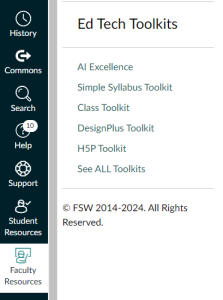The Asynchronous Classroom
9 Instructional Design
How Do Master Courses Ensure Quality in Online Education?

The State of Florida mandates the quality of Online Courses, facilitated through the adoption of the Quality Matters Higher Education Rubric. As stated in the CNA (See the section on Governing Bodies and Procedures Governing Policies and Procedures), for an online course to be delivered at Florida SouthWestern State College, it is required that that version of the online course be evaluated by certified Peer Reviewers and meet the essential standards of the latest edition of the QM Rubric. To facilitate this requirement, faculty are allowed to import and adapt an existing “Department/Master” course. We briefly touched on the purpose of “Master” Courses or “Department” Courses in our previous section on Course Imports. Review that section for details.
Do You Feel Inspired to Create an Online Course?
If a faculty member would like to develop his/her/their own course for online teaching in their field, they are welcome to enroll in the DEV 101 Certification Process and be certified to develop their own Individual Course, which will then be reviewed at the same standards as the Master Courses. This certification is open to any and all faculty who have completed the Online Teaching Certification. The DEV 101 Certification also qualifies the faculty member to develop Master courses for their subject matter should the department put forth a call for development.
How Does the Rich Content Editor Improve Accessibility and Student Interaction with Course Material?
The Rich Content Editor (RCE) is the space within the Canvas course that allows an instructor, TA, and even a student to create content and make it available within the LMS. The RCE has a toolbar that allows the user to include content such as text, images, videos, links, and other tools that have been contracted by FSW.
This means instructors can include not just text but various multimedia elements in their instruction. It also allows students to include these same elements within certain assignments, such as discussions.
View the video below to learn more about the RCE toolbar:
What Student Advantages Do Educational Technology Toolkits Offer?

FSW contracts with several different educational technology companies to utilize educational tools that enhance student learning. To ensure that the users of these tools always have access to professional development, FSW staff and faculty have developed various Toolkits for the most valuable tools FSW has purchased. This includes design and structural tools such as Design Plus, image and presentation tools such as Adobe Creative Cloud and Canva, and interactive tools such as Kahoot. We have also developed tools for emerging technologies, such as AI, that explore their place in education. These tools support various teaching strategies and learning styles, allowing faculty to deliver content in more engaging and effective ways.
To access these toolkits, instructors can click on “Faculty Resources” in the Canvas Navigation Bar. In the pop-out window, links to the most popular Toolkits and a link to a menu with all of the Toolkits can be found under the Ed Tech Toolkits Header.
Faculty Take
I’ve found that a lot of students lack content [knowledge] and online learning can be a great way to engage students in the material. Using extra interactive software such as Kahoot and Peardeck has also helped students stay more engaged and interested in course material.
Deep Dive
Now’s your chance! Become a superhero!
Media Attributions
- Laptop © Deactivated
- Ed Tech Toolkits
